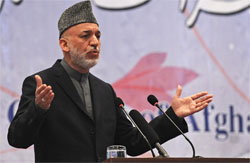CHRISTOPHER HITCHENS ON KARZAI’S DESPICABLE INCITEMENT****
Hamid Karzai’s despicable response to the Quran burning in Florida.
Heine’s famous observation about book burning—that where books are burned, people also will be—was actually first made about the torching of the Quran. The Spanish Inquisition used to delight in putting heretical works “on trial,” and zealously convicted the Muslim holy book before feeding it to the flames in what is one of Christianity’s oldest traditions. (After all, it extends to the burning of unauthorized translations of the Holy Bible, too.) Heine’s 1821 play Almansor contains a character who observes that humans will next be burned, and the later incineration of Heine’s own writings by the Nazis, with its prefiguration of the Holocaust, has made the quotation an imperishable one.
The connection, however, is not always so neat. The moronic pastor who burned the Quran after a mock trial would probably refrain from setting fire to human beings. While in Afghanistan, where Islam already makes huge numbers of books unavailable and The Satanic Verses and the Danish flag must be in short supply, the news of book burning somewhere else is enough in itself to cause the random incineration of people.
How dispiriting to see, once again, the footage of theocratic rage in Kandahar and Mazar-i-Sharif. The same old dreary formula: self-righteous frenzy married to a neurotic need to take offense; the easy resort to indiscriminate violence and cruelty; the promulgation of makeshift fatwas by mullahs on the make; those writhing mustaches framing crude slogans of piety and hatred, and yelling for death as if on first-name terms with the Almighty. The spilling of blood and the spoliation of property—all for nothing, and ostensibly “provoked” by the corny, brainless antics of a devout American nonentity, notice of whose mere existence is beneath the dignity of any thinking person.
The wonderful thing about the last two months had been precisely the absence of such sanguinary and theatrical nonsense. Large, orderly, humorous crowds formed in major Egyptian cities, all of them demanding the acceptance of civic responsibility not just by the organs of state, but by themselves. Immense care was taken to avoid breakage or looting or even littering, let alone bloodshed. All the emphasis was on dialogue and the civilized exchange of ideas, and though the word martyr was indeed used to describe those who laid down their lives in the struggle, the cult of human sacrifice for its own sake was not in evidence. In order to hear crowds chanting hypnotically about their willingness to sacrifice their blood (or indeed other people’s), one had to turn to the zombified groups of frightened loyalist “demonstrators” mobilized yet again by the regimes of Qaddafi and Assad.
But the ambitions of the Islamic fundamentalists are ultimately unappeasable. Already in Egypt they have launched vicious physical attacks on people suspected of harboring prostitutes or selling beer, as if either of these considerations had any bearing on the radical overhaul of a near-failed state. I don’t believe that in the long run the Salafists can quite negate the work of the Tahrir movement, but the terrible thing about indiscriminate violence and religious hysteria is how much damage a little of it can do. One determined sectarian can, in a night’s work, undo decades of coexistence between Christians and Muslims, or between Sunni and Shia, as the deadly work of the Bin Ladenists in several countries has recently confirmed.
As someone who advances the quaint belief that the removal of two of the worst regimes in the region—the Taliban and the Iraqi Baath Party—did not have nothing to do with the subsequent democracy “wave,” I also find it discouraging that some of the loudest expressions of sectarian emotion have come from Afghanistan and Iraq. Muqtada Sadr’s supporters have chosen to make Bahrain into an issue of pure Shiite self-pity, as if the local ambitions of Iran were to be discounted entirely. And Prime Minister Nouri al-Maliki’s ruling group, fresh from a clumsy attempt to ban the Iraqi Communist Party for its role in street protests, also seems to view the Gulf crisis through a single confessional optic.
But this narrowness pales beside the truly awful opportunism and cynicism of Afghanistan President Hamid Karzai. In previous cases of irrational violence, such as the bloody riots that occurred on the mere rumor of a Quran being desecrated in Guantanamo, he had taken quite a responsible line (pointing out, for example, that one library destroyed by the incendiaries had contained several fine old Qurans). Unlike some provincial mullahs, Karzai also knows perfectly well that the U.S. government is constitutionally prohibited from policing religious speech among its citizens. Yet, when faced with the doings of the aforementioned moronic cleric from Gainesville, he went out of his way to intensify mob feeling. This caps a long period where his behavior has come to seem like a conscious collusion with warlordism, organized crime, and even with elements of the Taliban. Already under constant pressure to make consistent comments about Syria and Libya, the Obama administration might want to express itself more directly about a man for whose fast-decomposing regime we are shedding our best blood.
Comments are closed.

